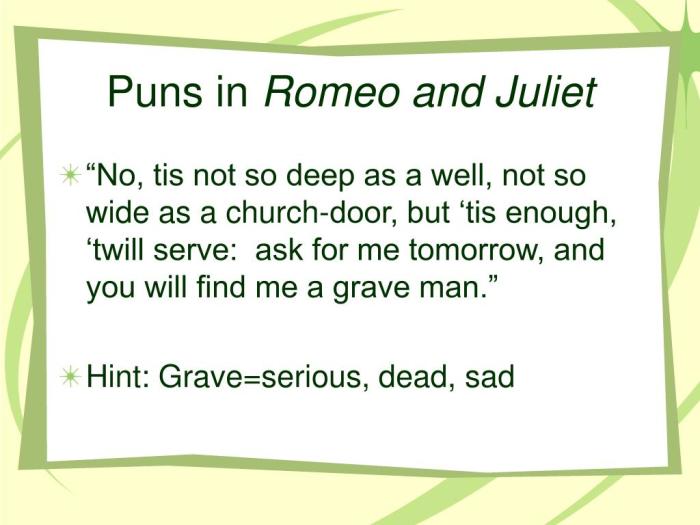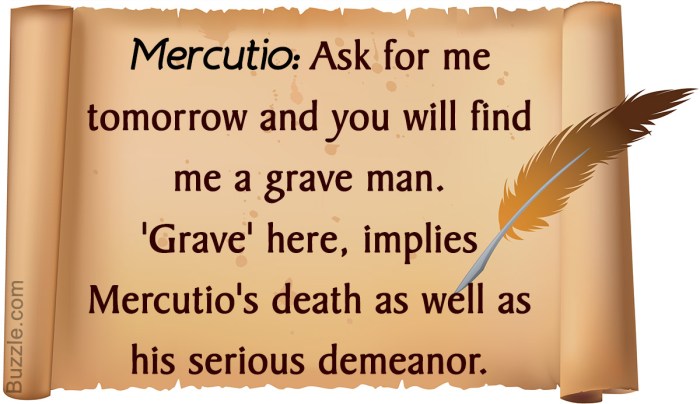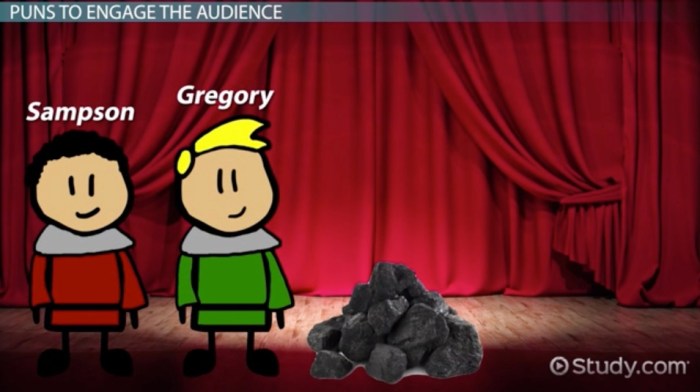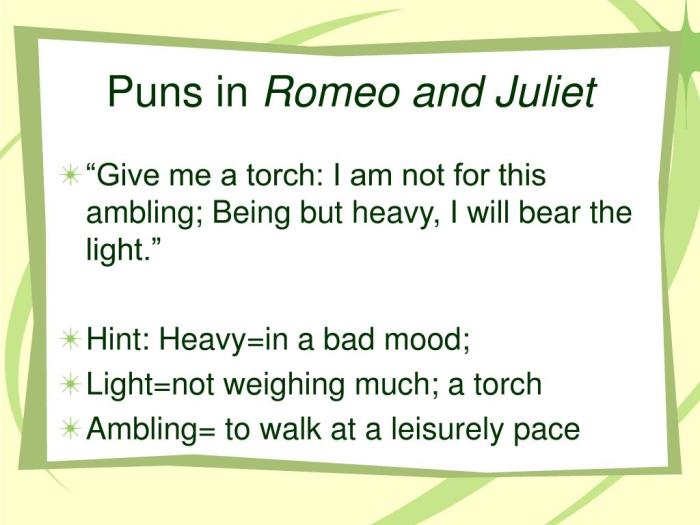Puns in Act One of Romeo and Juliet: Illuminating Character, Tone, and Plot explores the multifaceted role of puns in shaping the play’s characters, atmosphere, and narrative.
Through an analysis of specific examples, this discussion reveals how puns contribute to the play’s humor, foreshadowing, and character development, ultimately enhancing the audience’s understanding and appreciation of Romeo and Juliet.
Literary Devices

In Act One of Romeo and Juliet, William Shakespeare employs puns as a literary device to enhance the play’s comedic and dramatic elements. Puns, which involve the humorous use of words with multiple meanings, create a playful and witty atmosphere while also highlighting the characters’ emotional states and the underlying themes of the play.
Use of Puns in Act One
- Romeo’s Puns:Romeo uses puns to express his romantic feelings and wit. For instance, when he first meets Juliet at the Capulet’s ball, he says, “Did my heart love till now? For I ne’er saw true beauty till this night.” The pun on “heart” and “hart” (deer) creates a playful and flirtatious tone.
- Mercutio’s Puns:Mercutio, Romeo’s close friend, is known for his sharp wit and frequent use of puns. His puns often provide comic relief and highlight the play’s themes of love, fate, and violence. For example, when he is about to fight Tybalt, he says, “If you be not too tardy, then you shall find me a tortoise.”
This pun on “tardy” and “tortoise” suggests that Mercutio is aware of his own mortality and the futility of the duel.
Contribution to Tone and Atmosphere
The use of puns in Act One contributes to the overall tone and atmosphere of the play. The puns create a sense of lightness and humor, which balances out the play’s tragic elements. They also provide insight into the characters’ personalities and motivations, adding depth and complexity to the play.
Characterization

Puns are a significant literary device in Act One of Romeo and Juliet, employed by several characters to convey their personalities, relationships, and attitudes. The most frequent users of puns are Mercutio, Romeo, and Juliet.
Mercutio
Mercutio, the witty and Mercurial friend of Romeo, uses puns as a means of expressing his playful and sarcastic nature. His puns often poke fun at the conventions of courtly love and the seriousness of the Montagues and Capulets’ feud.
“If love be rough with words, then love is rough with deeds.” (Act 1, Scene 4)
This pun on the word “rough” highlights Mercutio’s irreverent attitude towards love and his belief that actions speak louder than words.
Romeo
Romeo, the romantic and idealistic lover, uses puns to express his deep emotions and to convey his wit and intelligence. His puns often reflect his youthful exuberance and his desire to find love and happiness.
“Did my heart love till now? For I ne’er saw true beauty till this night.” (Act 1, Scene 5)
This pun on the word “till” suggests that Romeo’s heart has never truly loved before meeting Juliet, and that she has awakened a new sense of love and beauty within him.
Juliet
Juliet, the intelligent and independent young woman, uses puns to express her wit and to challenge the societal expectations placed upon her. Her puns often reveal her quick mind and her desire for freedom and self-expression.
“My only love sprung from my only hate!” (Act 1, Scene 5)
This pun on the word “sprung” suggests that Juliet’s love for Romeo has emerged from the hatred between their families, highlighting the irony and complexity of their relationship.
The use of puns by these characters shapes the audience’s perception of them by revealing their personalities, motivations, and relationships. Mercutio’s puns emphasize his wit and sarcasm, Romeo’s puns convey his romanticism and idealism, and Juliet’s puns highlight her intelligence and independence.
Dramatic Impact

Puns in Romeo and Juliet play a significant role in creating humor and foreshadowing events, thereby advancing the plot and adding depth to the characters.
Creating Humor and Lightening the Mood, Puns in act one of romeo and juliet
Puns inject humor into the play, providing comic relief amidst the tragic events. For instance, Mercutio’s witty wordplay in Act I, Scene IV, where he puns on “grave” and “a scratch,” lightens the tense atmosphere and highlights his carefree nature.
Foreshadowing Events or Revealing Hidden Meanings
Puns often foreshadow upcoming events or reveal hidden meanings. In Act I, Scene V, Romeo’s pun on “star-crossed lovers” foreshadows the tragic fate of the titular characters. Additionally, Juliet’s play on words regarding “light” and “dark” in Act II, Scene II, hints at the duality of her feelings for Romeo.
Advancing the Plot or Resolving Conflicts
Puns can also contribute to the plot’s development or resolution of conflicts. In Act II, Scene IV, the Nurse’s pun on “Romeo” and “homeo” helps Friar Laurence understand Romeo’s true intentions, leading to the secret marriage. Furthermore, Mercutio’s puns in Act III, Scene I, foreshadow the tragic duel and contribute to the escalation of the conflict between the Montagues and Capulets.
Historical Context: Puns In Act One Of Romeo And Juliet
Puns were widely employed in Elizabethan literature, reflecting the era’s cultural fascination with wordplay and linguistic dexterity. They served as a form of intellectual entertainment, showcasing the author’s wit and erudition.
Cultural Significance
Puns played a significant role in Elizabethan society, permeating various aspects of life, from courtly entertainment to popular culture. They were a means of social commentary, allowing individuals to express opinions or criticize authority in a veiled manner.
Reflection of Social and Political Climate
The use of puns in Elizabethan literature often reflected the social and political climate of the era. For instance, puns on royal figures or political events provided a subtle way to express dissent or support without incurring direct consequences.
Modern Interpretations

Puns in Romeo and Juliet have undergone a variety of interpretations and adaptations in modern productions, reflecting the play’s enduring relevance and accessibility to contemporary audiences.
These adaptations often aim to enhance the play’s humor and relatability while exploring new thematic interpretations.
Innovative Uses of Puns
- In Kenneth Branagh’s 1996 film adaptation, Mercutio’s famous “A plague on both your houses!” is delivered as a pun on the word “plague,” referring both to the literal outbreak in Verona and the metaphorical disease of hatred between the Montagues and Capulets.
- In Baz Luhrmann’s 1996 film adaptation, the Nurse’s line “I have seen the day that I have worn a better gown” is delivered with a double meaning, referring both to her physical appearance and to the loss of her innocence and youth.
- In the 2013 Broadway production directed by David Leveaux, Romeo’s line “Is she a Capulet? O dear account! My life is my foe’s debt” is delivered with a pun on the word “debt,” referring both to the financial obligation he owes to the Capulets and the emotional debt he feels towards Juliet.
Common Queries
What is the significance of puns in Act One of Romeo and Juliet?
Puns in Act One establish the play’s tone, reveal character traits, and foreshadow events, enhancing the audience’s understanding and enjoyment.
How do puns contribute to the characterization in Act One?
Puns reveal characters’ personalities, relationships, and hidden intentions, providing insights into their motivations and complexities.
In what ways do puns impact the plot of Act One?
Puns foreshadow upcoming events, create humor, and resolve conflicts, shaping the play’s narrative arc and keeping the audience engaged.